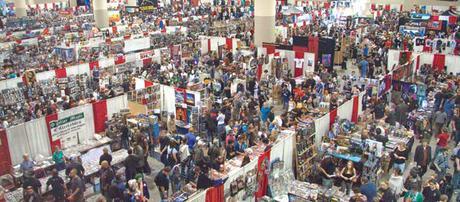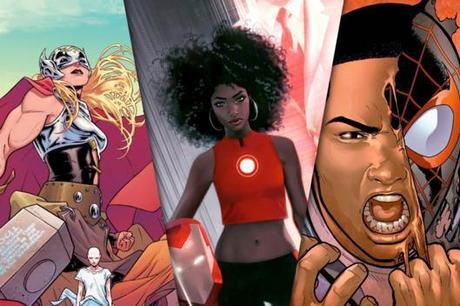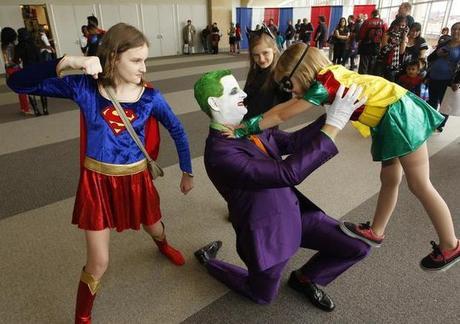
"It's easy to be in a cocoon as a white dude."
That's what podcaster Al Kennedy tweeted yesterday. He was speaking specifically about race relations in America, how even the most progressive white person can still be deeply ignorant about race without realizing it.
It's a timely comment. Police officers needlessly killed not one but two black people this week, first in Louisiana and then in Minnesota. Both instances were captured on video and understandably lit up social media. Black Lives Matter protests and marches were swiftly organized around the country, but one of them turned deadly last night when snipers took advantage of a downtown Dallas march to open fire on police officers, presumably in retaliation for Louisiana and Minnesota. Five officers are dead, including the first ever Dallas Area Rapid Transit officer to be killed in the line of duty, and at least nine more people are wounded.
Now, it turns out there was a similar shooting in Tennessee on Thursday morning, with another black shooter targeting white people.
Notable African-American figures, from President Obama to Lebron James (and a crapton other big name athletes), have stepped forward to beg people to stop the violence, yet I opened this article with a quote from a white guy. Moreover, that guy wasn't even talking about Louisiana, Minnesota or Dallas; he was referring to Marvel's decision to make the next Iron Man a 15-year-old black girl.
 To recap, on Wednesday Marvel announced that after its current Civil War II arc wraps-up later this year Tony Stark will be replaced as Iron Man by Riri Williams, a 15-year-old MIT prodigy who was only recently introduced in the pages of Invincible Iron Man. Brian Michael Bendis, the prolific comic book writer chiefly responsible for prior torch bearers like Miles Morales (the mixed-race Spider-Man) and Jessica Jones, is similarly responsible for the creation of Williams and will be handling the writing duties once her time comes to shine. As he told Time, she is meant to be an inspirational figure, a character whose life was marred by random street violence which she managed to rise above and emerge as part of the new generation of heroes which already includes a mixed-race Spider-Man, black Captain America, Muslim Ms. Marvel, Asian-American Hulk and female Thor and Captain Marvel.
To recap, on Wednesday Marvel announced that after its current Civil War II arc wraps-up later this year Tony Stark will be replaced as Iron Man by Riri Williams, a 15-year-old MIT prodigy who was only recently introduced in the pages of Invincible Iron Man. Brian Michael Bendis, the prolific comic book writer chiefly responsible for prior torch bearers like Miles Morales (the mixed-race Spider-Man) and Jessica Jones, is similarly responsible for the creation of Williams and will be handling the writing duties once her time comes to shine. As he told Time, she is meant to be an inspirational figure, a character whose life was marred by random street violence which she managed to rise above and emerge as part of the new generation of heroes which already includes a mixed-race Spider-Man, black Captain America, Muslim Ms. Marvel, Asian-American Hulk and female Thor and Captain Marvel.
By Thursday, geek commentators and the Twitter hive mind weren't chastising Bendis for effectively making a traditionally white character black, as you'd expect. Instead, they were mad that this black character will be written by a white guy, and that Marvel doesn't even have a single black female writer right now.
Al Kennedy asked his Twitter friend, "Q for the superhero comics historians: has a black woman ever written an ongoing series for Marvel?" When it turned out no black female has ever written a Marvel comic in the company's 77-year history, Kennedy concluded, "Jeez. Feel like an prime idiot for not picking up on this before now. Easy to be in a cocoon as a white dude."
In its assessment of the controversy, Vulture concluded, "The issue being addressed in the past 24 hours is the fact that four of the most lucrative and famous of these race/gender-switched characters - Spider-Man, Iron Man, Thor, and Captain America - are being narratively stewarded by people who don't share their ethnic or gender identities. Their solo titles are all being written by white men."
Marvel can't drape itself in the flag of progressiveness if the improvements in representation are only occurring on the page and not behind the scenes. But that's not completely fair. The number of female creators at Marvel is generally on the rise, up to 19% (it used to be closer to zero). Plus, Sana Amanat has emerged as a cultural hero to all, a Pakistani-American Muslim woman who created Marvel's first Muslim character (Kamala Khan) and now serves as the company's Director of Content & Character Development. When asked about the representation vs. opportunity debate earlier this year by The Mary Sue she argued:
When you're a very good writer, you know how to write experiences that are different from your own, that are distinct, and that's fundamentally what it means to be a good writer. It doesn't matter if you're white, black, brown, whatever - you need to know how to get into what makes a character a character; what makes them interesting and relatable
If I might argue with myself for a moment, what in the Sam Hill does any of this have to do with what happened in Dallas? Some comic book fans are peeved about representation vs. opportunity? Who gives a shit? People literally died yesterday. The racial make-up of our comic books or whatever other facets of pop culture we use to entertain ourselves doesn't seem especially important right now.
Here's the thing, though: I was just in Dallas for a comic book convention. According to The Atlantic, the Dallas shootings occurred near the corner of Main Street and Lamar Street. In the first weekend of June, I spent two solid days walking up and down those very streets. I was staying at a hotel just one block north of that location with fellow WMIFer Julianne. We were in town attending Dallas Fan Expo.
- Did we spend a seemingly interminable amount of time simply standing in line for things? Sure.
- Were certain appearances and planned panels canceled or rescheduled with practically no notice? Damn you, Peter Mayhew (shakes fist in the air like a cartoon character)!
- Did we ever actually have a chance of being able to see and do everything we wanted? It's so cute that you'd ask that.
- Was the food overpriced? For the most part, although the pretzels were pretty reasonable.
- Was it all still worth it? Of course.
But why was it worth it? Because this is what we geeks do. Sports fans turn stadiums into temples because a sense of history and community deems that to be the socially acceptable response. Over the past two decades, sci-fi/comic book conventions have grown at a rate commensurate with the comedy club boom of the 1980s, and they have become temples for the nerds and geeks. Of course any large gathering of people is going to involve lots of lines and frustration, and captive audiences are fish in a barrel for price-gouging vendors. But where else can we go and strike up an immediate conversation with random strangers about the glaring flaw in the original U.S. Power Rangers (e.g., Why do all the villains just stand around while the Rangers form their machine? That's the perfect time to attack)? Or how we still can't believe how much Caroline grew from the first to the second season of Vampire Diaries?
On Twitter. And Facebook. Through Tumblr, WordPress and all sorts of other blogging platforms. In the comments sections of AV Club articles, or on IMDB message boards. Those are the types of places we can go to have some those same kinds of conversations with complete strangers. It's how sites like Vulture essentially crowdsource arguments over polarizing pop culture topics, and it's how I even became aware of Al Kennedy, someone I most likely will never meet in person.
In those arenas, arguments like the one about Marvel's representation vs. opportunity problem are in perpetual motion, just cut and paste one hot button topic (the female-led Ghostbusters, the white-washing of Ghost in the Shell and Doctor Strange, #OscarsSoWhite, etc.) for another. It's what we do. We love pop culture so much we want it to be better, and social media allows us to engage with pop culture creators in unprecedented ways, giving us a sometimes outsized sense of ownership and influence.
By comparison, something like FanExpo is the more traditional experience. We pay to go see someone, even though we might not even have any direction interaction with them. Personally, I was at Fan Expo to see Stan Lee (he'll outlive many of us, but he will die at eventually). The meeting people was the surprise bonus on the side.
Any annoyance with all of the walking and standing in line was lessened by the routine delight of walking past someone in a truly ingenious or completely random costume. There's a line in The Purge: Election Year which describes the titular killing event as "Halloween for adults." Well, geek conventions are like Halloween for adults AND kids. I saw so many families in attendance, many of them in costume together (e.g., one family dressed up as the Belchers from Bob's Burgers). Or how about these daughters as DC heroines taking on their dad as the Joker?
 In one panel, I sat behind a family of X-Men, the father making for the spitting image of Wolverine from Days of Future Past. In fact, I couldn't stop staring. I felt like I was looking at Hugh Jackman.
In one panel, I sat behind a family of X-Men, the father making for the spitting image of Wolverine from Days of Future Past. In fact, I couldn't stop staring. I felt like I was looking at Hugh Jackman.
Of course, this was all new to me. Juli's an old pro. At one point she compared notes with a fellow well-traveled convention veteran, and they might as well have been Robert Shaw and Richard Dreyfus comparing scars in Jaws. I was the Roy Scheider of the scenario, too embarrassed to even mention the one measly scar I have (i.e., that I once attended a very, very small Doctor Who convention).
However, there was a disquieting element to my FanExpo experience which had less to do with FanExpo and more to do with Dallas. Every morning on my walk to the Dallas Convention Center and every evening back to the hotel I passed the same black homeless people on the street. According to the Metro Dallas Homeless Alliance's 2016 census, there are currently 3,900 homeless people in Dallas, a 20% increase from last year. Of those 3,900, 60% are African-American. Whites are a distant second at 33%.
Is that bad? Good? About average?
Dallas is the 9th most populated city in the United States. Let's compare its homeless data to the 9 other most populous cities in the country:
* Refers to homeless shelter residents as opposed to a count of all homeless, shelter or unsheltered
N.R. = Not Reported, or at least if there is any recent demographic breakdown I couldn't find it
So, Dallas is closer to Chicago, Los Angeles and New York than San Jose, San Diego and San Antonio in the sense that the majority of its homeless population is black.
That's great (or not, obviously, for the homeless people and cities), but what does that have to do with the shooting in Dallas or FanExpo?
Well, those homeless people I kept walking past weren't the only visible reminders of race I encountered in Dallas. As I understood it, FanExpo itself was staffed by volunteers, the nice, loud people making sure we all stayed in straight lines. However, there also appeared to be a separate category of paid employees on hand, as indicated by the different logos on their shirts. These were the people providing security, and preventing attendees from re-entering the convention floor through forbidden entrances. They also manned the various food kiosks.
And they all happened to be black.
That's not true. There were surely people of different races working these jobs, but I never saw any of them. Instead, every non-volunteer worker I walked by was black, and it seemed like a significant chunk of the convention attendees I passed were white. Of course, that's anecdotal, and in no way verifiable. When I casually mentioned this to Juli she'd made no such similar observation, and any fellow FanExpo attendee who happens to read this could shoot me down in the comments section.
It wasn't just at the convention, though. All of the front desk personnel at our hotel were black as were many of the hotel's various other personnel
Maybe that's because Dallas-Forth Worth is considered the fifth most racially diverse Metropolitan Area in the United States, 50% White, 27% Hispanic, 15% African-American and 6% Asian.
Or maybe I just sound like a huge racist. However, my point is not to diminish food service, security or hotel workers, or to somehow suggest the high number of black workers made me uncomfortable in any way. I was just surprised by how consistent it was. I was in town to celebrate fantasy, really, and in the process I was getting a peek into one remarkably specific subset of Dallas' work force.
I found it fascinating from an economical and sociological point of view, the same exact way I was intrigued (and a little scared, to be honest) when I stopped off at a Wal-Mart on the way in to Dallas and was introduced to the state's "Right to Carry" law when a scruffy white guy in a tank top walked by me with a semi-automatic weapon nonchalantly dangling from his hip. It all suggested to me a larger world of genuine problems, the likes of which I was ignoring and escaping from while listening to Stan Lee tell the old story about how he created Spider-Man.
Here are some sadder stories: Dallas has the highest poverty rate of any city in Texas, and keep in mind that it's only the third biggest city in the state. 9 5% of Dallas' mostly upper-income areas are dominated by white households. Dallas also has the 34th highest rate of income inequality among the top 100 Metropolitan areas, and the entire state of Texas ranks fifth in the country in income inequality.
"When you look at poverty rates for African-Americans and Hispanics, they are two or three times as high as they are for non-Hispanic whites. Blacks and Hispanic incomes are 60 to 75 percent compared to whites," said Steve Murdock, a R ice University professor interviewed by the Star-Telegram.
But what does that have to do with the shooting? The snipers targeted police officers, not white business leaders. This wasn't a referendum on economics, racial inequality or homelessness. This was about rage over police brutality, a sadly misdirected rage, as it turns out. According to The Atlantic, "Dallas's reform-oriented police department is considered a national model, credited with improving transparency and lowering homicide rates. The department's official Twitter account posted photos earlier Thursday night of officers peacefully mingling with protesters at the demonstration."
When I look at those photos I realize I've actually been on those streets, but I was there to see a bunch of celebrities talk about their movies/TV shows/comic books. These people were there to make their voices heard, to shout out that Black Lives do Matter. The Dallas cops were there to keep the peace and let the protestors know that their voices were being heard. And some people who didn't deserve to die are dead now.
In the immediate aftermath of the shooting, as the police arrested a suspect (who was later found innocent and let go) reporters caught the back and forth between some protesters and one officer. One girl reportedly shouted something to the effect that she was there because she wanted to make a difference in the world, and the cop quickly assured her that she still can.
Earlier that very morning, Brian Michael Bend was describing the new black, female Iron Man as being a survivor of random street violence. If Riri Williams can be Iron Man then maybe that girl in Dallas truly can overcome this and not give in to despair. That seems like a trite thing to say, remarkably patronizing even. However, as a geek sometimes changing a character's skin color is the best we can do, and the Twitter arguments we have over representation are our little ways of trying to make a difference in the world. But maybe sometimes the heroes of our stories should inspire us to become the heroes of our own story.

